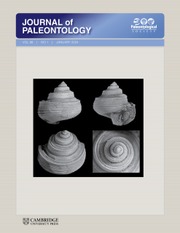Article contents
Biogeography of northeastern Atlantic Neogene chitons (Mollusca, Polyplacophora): New data from the Pliocene of Portugal
Published online by Cambridge University Press: 08 March 2022
Abstract
Based on extensive new material, 2088 valves resulting from search sampling of ~500 kg of sediment, the Pliocene chiton biodiversity of the Mondego Basin (Portugal) is reassessed. Twelve species were identified, assigned to seven genera. Eight species are new for the Pliocene of Portugal, as well as two of the genera: Hanleya, Acanthochitona. Two taxa are described as new: Ischnochiton loureiroi n. sp. and Lepidochitona rochae n. sp. Until now, the polyplacophoran European Neogene record was too poorly known to be of help in generating a clear picture of the Miocene to present-day biogeography of the group. This new wealth of data from western Iberia, in conjunction with recent data from the Loire Basin Upper Miocene assemblages (France), allows clarification the Late Miocene to Recent eastern Atlantic and Mediterranean biogeography of the Polyplacophora. The northern range of warm-water northeast Atlantic and Mediterranean Polyplacophora experienced a sharp contraction since, at least, Late Miocene to Early Pliocene times. Warm-water chiton species represented in the Upper Miocene of the Loire Basin of NE France (European-West African Province) and the Pliocene of the Mondego Basin of central-west Portugal (Pliocene French-Iberian Province) are today confined to the southern Mediterranean-Moroccan Molluscan Province.
UUID: http://zoobank.org/a2a550c0-caed-449a-aa45-9492c45f882e
- Type
- Articles
- Information
- Copyright
- Copyright © The Author(s), 2022. Published by Cambridge University Press on behalf of The Paleontological Society
References
- 1
- Cited by



